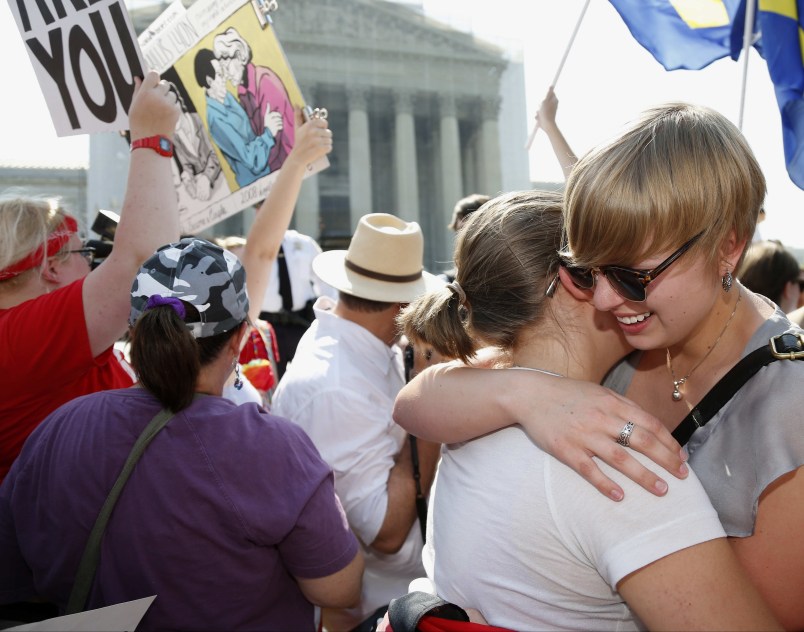The Supreme Court dropped a bombshell on Monday morning by announcing it won’t hear any of the same-sex marriage cases before them, which means gay couples can marry without delay in Oklahoma, Utah, Virginia, Wisconsin and Indiana.
After the justices made their move, the 10th Circuit Court of Appeals, the first appellate court to find a constitutional right to same-sex marriage, quickly lifted the stay on its June ruling legalizing gay marriage in Utah.
The move is also good news for same-sex couples in six other states: North Carolina, South Carolina, West Virginia, Colorado, Kansas, Wyoming. They won’t be able to marry just yet, but they can sue for that right, and lower courts in each of those states are bound by the pro-gay-marriage rulings of appeals courts.
That would bring legal gay marriage to 30 states and the District of Columbia. For that reason, the Supreme Court’s move is a “victory for marriage equality,” said Erwin Chemerinsky, the Dean of UC-Irvine law school.
“Next we’ll see LGBT couples asking courts that have ruled in favor of marriage equality to lift the existing stays that prevent them from marrying,” said Adam Winkler, a law professor at UCLA law school. “The justices are happy to allow this issue to percolate in the lower courts until there is a circuit split.”
But the Supreme Court’s decision to stay out of the issue is bad news for gay couples in states like Texas, Mississippi and Tennessee, which may now have to wait longer before they can marry. Cases are pending before the conservative-leaning 5th and 6th Circuits, which observers see as the likeliest venues for a split that could force Supreme Court action.
“If there is a circuit split I think that is much more likely they take a case, and a 5th (and or 6th) Circuit split seems fairly likely,” Rick Hasen, a law professor at UC-Irvine law school, said in an email.
If one or both circuits issue a decision upholding bans on gay marriage by January, the Supreme Court could still take the case and resolve the issue by next June. If not, couples in other states may have to wait longer to be able to marry.
“[M]arriage equality still does not exist in many states and it is hard to understand what the Court thinks is gained by waiting for a Circuit split here rather than it resolving the issue for the nation,” Chemerinsky said.
The court’s order on Monday means there were fewer than four votes to hear any of the same-sex marriage cases. Justice Ruth Bader Ginsburg said last month that “there will be some urgency” for the Supreme Court to act if the 6th Circuit (which heard oral arguments last month) rules against gay marriage, but if it rules for gay couples there is “no need for us to rush.”
Opponents of gay marriage saw hope in the Supreme Court’s move.
“The court’s decision not to take up this issue now means that the marriage battle will continue. Several federal courts — including those in the 5th, 6th, 8th, and 11th circuits — still have cases working their way to the Supreme Court,” said Byron Babione, senior counsel for the Alliance Defending Freedom, a conservative Christian group. “The people should decide this issue, not the courts.”
This article was updated at 12:28 p.m. ET to mention Utah’s order lifting the stay.







The people have decided, the people want equality for all. Black, white, gay, lesbian, straight, whatever, the people want equality and fools like Byron Babione will find themselves on the wrong side of history just like the KKK did.
Well, however it turns out in the short term, I am still tickled to death to think of gays marrying in Oklahoma and Utah.
And in the long term, it’s a done deal.
If the justices were up in arms over same-sex marriage, they could easily have taken one or more of these cases. They don’t require a split among the circuits, that’s just one reason for taking a case. The not-so-subtle message to the Circuit Courts is that the Supremes are unlikely to overturn all of the rulings in favor of gay marriage.
The same analysts predicting a split predicted the Supreme Court would take a case this term
justsayin
Several federal courts — including those in the 5th, 6th, 8th, and 11th circuits — still have cases working their way to the Supreme Court,"
So, do these Federal courts still have any legal basis to deny equal marriage?
As I recall, the dissenters have been using Baker v. Nelson.